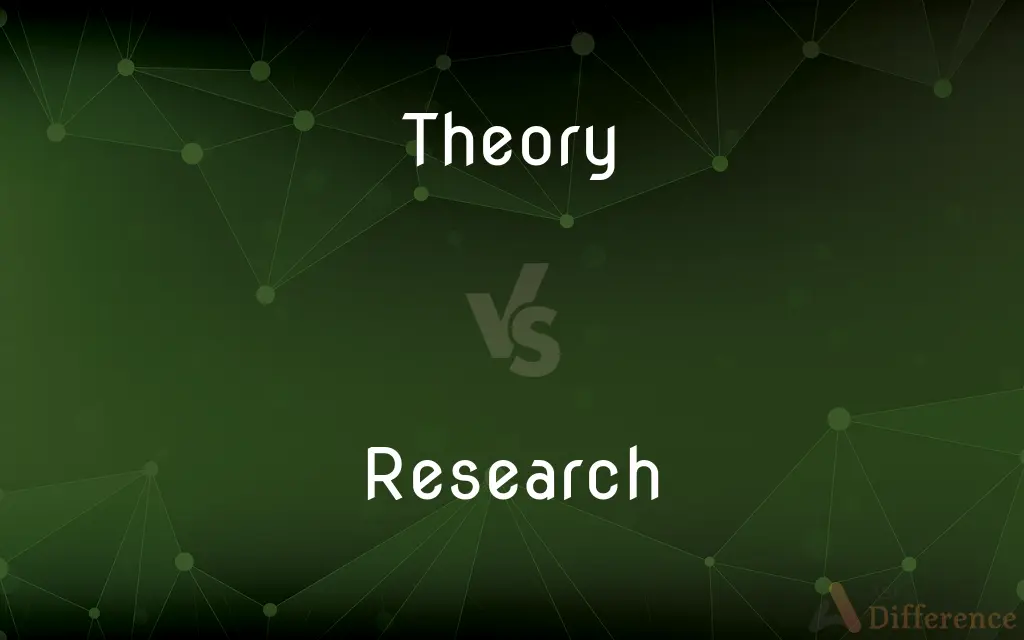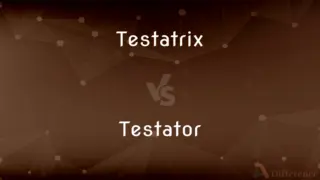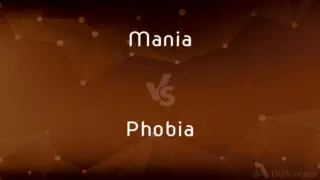Theory vs. Research — What's the Difference?
By Maham Liaqat & Fiza Rafique — Updated on March 14, 2024
Theory is a structured framework for understanding phenomena, while research is the systematic investigation to discover new information.

Difference Between Theory and Research
Table of Contents
ADVERTISEMENT
Key Differences
Theory provides a conceptual framework or set of principles that help understand and predict phenomena. It is often developed through synthesis of knowledge from previous research and can be used to generate hypotheses for future studies. Research, on the other hand, involves the systematic investigation of materials and sources to establish facts and reach new conclusions. This process is essential for gathering evidence to test theories or contribute to developing new theoretical frameworks.
Theories are crucial for establishing a basis for understanding in various fields, offering explanations for why things happen in a certain way. Research methods vary widely, including experimental, observational, and analytical approaches, each designed to answer specific types of questions.
While theory seeks to explain relationships between variables and understand the underlying principles of phenomena, research focuses on the empirical collection of data to test hypotheses or discover new knowledge. Theories are abstract and generalized, aiming to provide a broad understanding, whereas research is often more concrete and specific, targeting particular questions or issues.
Theory can exist without direct empirical evidence to support it, relying on logical coherence and integration with existing knowledge. In contrast, research requires concrete data collection and analysis to validate or refute hypotheses. The relationship between theory and research is symbiotic; theory guides the development of research questions and the interpretation of data, while research provides the evidence needed to support, refine, or challenge theories.
Research often leads to the development of new theories or the refinement of existing ones as new data emerge. This iterative process of theory and research propels knowledge forward, enabling a deeper understanding of complex phenomena.
ADVERTISEMENT
Comparison Chart
Purpose
To explain phenomena and predict outcomes.
To systematically investigate phenomena to gather new information.
Basis
Conceptual understanding and logical structuring of knowledge.
Empirical evidence and data collection.
Nature
Abstract and generalized.
Concrete and specific.
Role in Knowledge
Provides a framework for understanding and predicting phenomena.
Tests, refines, or challenges theoretical frameworks.
Outcome
Development of principles and hypotheses.
Discovery of facts, new information, and conclusions.
Compare with Definitions
Theory
A hypothesis assumed for the sake of argument or investigation.
Let's consider the theory that the painting is a forgery.
Research
Collection and analysis of data and information.
He gathered data for his research during numerous field trips.
Theory
An abstract thought or speculation.
I have a theory about why they vanished.
Research
A careful hunt for new facts in any branch of knowledge.
The library facilitated her extensive research on ancient texts.
Theory
A system of ideas intended to explain something.
Einstein's theory of relativity.
Research
Experimentation aimed at discovering and interpreting phenomena.
Their research involved experiments with new chemical compounds.
Theory
A set of principles on which the practice of an activity is based.
The theory of evolution explains the diversity of life.
Research
Detailed study of a subject to discover new information.
The team is conducting research on renewable energy sources.
Theory
An idea used to account for a situation or justify a course of action.
His decision was based on the theory that it would save time.
Research
The systematic investigation into and study of materials and sources to establish facts and reach new conclusions.
Her research focuses on cancer treatment.
Theory
A theory is a rational type of abstract thinking about a phenomenon, or the results of such thinking. The process of contemplative and rational thinking is often associated with such processes as observational study or research.
Research
Research is "creative and systematic work undertaken to increase the stock of knowledge". It involves the collection, organization, and analysis of information to increase understanding of a topic or issue.
Theory
A set of statements or principles devised to explain a group of facts or phenomena, especially one that has been repeatedly tested or is widely accepted and can be used to make predictions about natural phenomena.
Research
The systematic investigation into and study of materials and sources in order to establish facts and reach new conclusions
He prefaces his study with a useful summary of his own researches
Medical research
The group carries out research in geochemistry
Theory
The branch of a science or art consisting of its explanatory statements, accepted principles, and methods of analysis, as opposed to practice
A fine musician who had never studied theory.
Research
Investigate systematically
The team have been researching into flora and fauna
She has spent the last five years researching her people's history
Theory
A set of theorems that constitute a systematic view of a branch of mathematics.
Research
Careful study of a given subject, field, or problem, undertaken to discover facts or principles.
Theory
Abstract reasoning; speculation
A decision based on experience rather than theory.
Research
An act or period of such study
Her researches of medieval parish records.
Theory
A belief or principle that guides action or assists comprehension or judgment
Staked out the house on the theory that criminals usually return to the scene of the crime.
Research
To engage in or perform research.
Theory
An assumption based on limited information or knowledge; a conjecture.
Research
To study (something) thoroughly so as to present in a detailed, accurate manner
Researching the effects of acid rain.
Theory
A description of an event or system that is considered to be accurate.
Research
To do research for
Research a magazine article.
Theory
(sciences) A coherent statement or set of ideas that explains observed facts or phenomena and correctly predicts new facts or phenomena not previously observed, or which sets out the laws and principles of something known or observed; a hypothesis confirmed by observation, experiment etc.
Research
Diligent inquiry or examination to seek or revise facts, principles, theories, applications, etc.; laborious or continued search after truth.
The research station that houses Wang and his team is outside Lijiang, a city of about 1.2 million people. File:The research station that houses Wang and his team is outside Lijiang.ogg
Theory
(uncountable) The underlying principles or methods of a given technical skill, art etc., as opposed to its practice.
Research
A particular instance or piece of research.
Theory
(mathematics) A field of study attempting to exhaustively describe a particular class of constructs.
Knot theory classifies the mappings of a circle into 3-space.
Research
(transitive) To search or examine with continued care; to seek diligently.
Theory
A hypothesis or conjecture.
Research
(intransitive) To make an extensive investigation into.
Theory
A set of axioms together with all statements derivable from them; or, a set of statements which are deductively closed. Equivalently, a formal language plus a set of axioms (from which can then be derived theorems). The statements may be required to all be bound (i.e., to have no free variables).
A theory is consistent if it has a model.
Research
(transitive) To search again.
Theory
A doctrine, or scheme of things, which terminates in speculation or contemplation, without a view to practice; hypothesis; speculation.
Research
Diligent inquiry or examination in seeking facts or principles; laborious or continued search after truth; as, researches of human wisdom; to research a topic in the library; medical research.
The dearest interests of parties have frequently been staked on the results of the researches of antiquaries.
Theory
An exposition of the general or abstract principles of any science; as, the theory of music.
Research
Systematic observation of phenomena for the purpose of learning new facts or testing the application of theories to known facts; - also called scientific research. This is the research part of the phrase "research and development" (R&D).
Theory
The science, as distinguished from the art; as, the theory and practice of medicine.
Research
To search or examine with continued care; to seek diligently.
Theory
The philosophical explanation of phenomena, either physical or moral; as, Lavoisier's theory of combustion; Adam Smith's theory of moral sentiments.
Research
Systematic investigation to establish facts
Theory
A well-substantiated explanation of some aspect of the natural world; an organized system of accepted knowledge that applies in a variety of circumstances to explain a specific set of phenomena;
Theories can incorporate facts and laws and tested hypotheses
True in fact and theory
Research
A search for knowledge;
Their pottery deserves more research than it has received
Theory
A tentative theory about the natural world; a concept that is not yet verified but that if true would explain certain facts or phenomena;
A scientific hypothesis that survives experimental testing becomes a scientific theory
He proposed a fresh theory of alkalis that later was accepted in chemical practices
Research
Inquire into
Theory
A belief that can guide behavior;
The architect has a theory that more is less
They killed him on the theory that dead men tell no tales
Research
Attempt to find out in a systematically and scientific manner;
The student researched the history of that word
Common Curiosities
Can research be conducted without a theory?
Research can be exploratory, gathering data without a predefined theoretical framework, but it often aims to test or generate theories.
How do theory and research interact?
Theory guides the development of research questions and the interpretation of data, while research tests and refines theories.
What is research?
The systematic investigation of materials and sources to discover new information or reach conclusions.
What makes a good theory?
A good theory is logical, consistent, predictive, and can be empirically tested.
Can a theory exist without research?
Yes, a theory can be based on logical structuring of existing knowledge without direct empirical evidence.
Can research refute a theory?
Yes, if empirical data consistently contradict the predictions of a theory, the theory may be refined or rejected.
Can a single study disprove a theory?
Generally, multiple studies are needed to challenge a theory, considering the complexity and variability of scientific inquiry.
Is a hypothesis the same as a theory?
No, a hypothesis is a specific, testable prediction derived from a theory, used in research.
What is a theory?
A structured framework of principles designed to explain phenomena and predict outcomes.
How does research contribute to scientific knowledge?
Research provides the empirical evidence needed to support or challenge theories, driving scientific progress.
Is theory more important than research?
Both are crucial in their own right; theory provides the framework for understanding, while research provides the evidence.
Why is theory important in research?
It helps to conceptualize research questions, guides data interpretation, and provides a framework for understanding results.
What is the role of research in society?
Research informs policy, advances technology, improves societal welfare, and expands human knowledge.
How do theories evolve?
Theories evolve through the iterative process of hypothesis testing, research findings, and the integration of new knowledge.
What types of research are there?
Research can be qualitative or quantitative, experimental or observational, among other types.
Share Your Discovery

Previous Comparison
Testatrix vs. Testator
Next Comparison
Mania vs. PhobiaAuthor Spotlight
Written by
Maham LiaqatCo-written by
Fiza RafiqueFiza Rafique is a skilled content writer at AskDifference.com, where she meticulously refines and enhances written pieces. Drawing from her vast editorial expertise, Fiza ensures clarity, accuracy, and precision in every article. Passionate about language, she continually seeks to elevate the quality of content for readers worldwide.














































